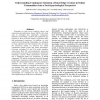Free Online Productivity Tools
i2Speak
i2Symbol
i2OCR
iTex2Img
iWeb2Print
iWeb2Shot
i2Type
iPdf2Split
iPdf2Merge
i2Bopomofo
i2Arabic
i2Style
i2Image
i2PDF
iLatex2Rtf
Sci2ools
150
click to vote
HICSS
2009
IEEE
2009
IEEE
Understanding Continuance Intention of Knowledge Creation in Online Communities from a Social-Psychological Perspective
Grounded on both social cognitive theory and expectation-disconfirmation theory (EDT), this study aims to investigate how individuals’ continuance intention of knowledge creation and satisfaction are affected by their perceived identity verification (PIV) and performance expectancy. In addition, we also explore how the foregoing relationships are contingent on trust—affective trust and cognitive trust. To assess the theoretical model, we surveyed two online communities—Baidu (Cina) and Yahoo knowledge+ (Taiwan), including 213 and 216 useful responses respectively. Both PIV and performance expectancy are positively associated with continuance intention of knowledge creation. While performance expectancy has a significant impact on satisfaction, in Baidu community, PIV affects satisfaction indirectly (through performance expectancy) rather than directly. Finally, neither the relationships between PIV and continuance intention nor those between performance and continuance intention...
Biometrics | Continuance Intention | HICSS 2009 | Knowledge Creation | Performance Expectancy | System Sciences |
| Added | 19 May 2010 |
| Updated | 19 May 2010 |
| Type | Conference |
| Year | 2009 |
| Where | HICSS |
| Authors | Shih-Wei Chou, Ching-Chang Lee, Yu-Chieh Chang, Chun-Tong Lin |
Comments (0)

